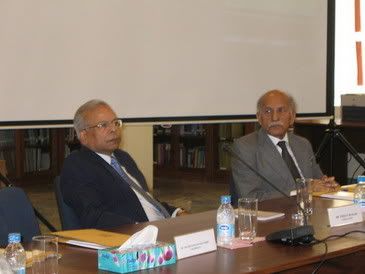Lahore School of Economics First Annual Conference on Management of the Pakistan Economy Concludes
April 30, 2005

Dr. Ishrat Hussain, the Governor State Bank of Pakistan, presiding over first session of the First Annual Conference on Management of Pakistan Economy.
Lahore School of Economics First Annual Conference on Management of the Pakistan Economy concluded here on April 30, 2005. In the concluding session, Dr. Moazam Mahmood from International Labor Organization gave out the recommendations the came out during past three days. Dr. Amjad Chaudhry, Rector Lahore School of Economics was in Chair.
Over an intensive three days, from 28 to 30 April 2005, a number of pre-eminent economic decision makers, economists, industrialists, academics and intellectuals were invited to discuss a broad range of key issues on management of the economy. The presentations and discussions flowed logically and very well, from macro management of fundamentals of the economy, investment, growth, budgetary deficits, and external balances, to reliance on private sector investment, the role of the Public Sector Development Program, the fiscal feasibility of raising public expenditure to support this program, and the monetary constraints on doing this. The discussion then moved on from examining the macro aggregates of the economy to a focus on the real sectors of the economy, the growth and potential of the agricultural sector, the competitiveness of the post MFA industrial sector, and the institutional mechanisms for managing these sectors. The third day focused on three priority policy challenges, human resource development, poverty and employment, and governance.
Many important policy priorities came out clearly over these three days. Dr. Ishrat Hussain the Governor of the State Bank of Pakistan was satisfied with the management of macro fundamentals, and said that the recent recovery in growth had been enabled by lowering the price of credit, but inflationary pressures threatened, hence the increase in interest rates from a range of 4% to 9%. Ashraf Janjua, the former Deputy Governor of the State Bank urged an even more cautionary approach, and urged raising interest rates further to contain inflation. However he agreed that growth was a prerogative, especially if it was pro poor, and stated that with this caveat higher inflation could be tolerated for the sake of such higher growth.
The Minister for Investment Dr. Abdul Hafeez Sheikh prioritized the role of the private sector in generating this growth, but was concerned that the state pre-empted much of this space from the private sector, or certainly rationed this space. Dr. A. R. Kemal examined the feasibility of generating this growth through increased public expenditures, but was worried at the inelasticity of revenues, which did not seem to rise with growth, and feared that unless this was enabled, increased expenditures would increase budgetary deficits and the debt burden.
Dr. Akmal Hussain pointed to challenges in agriculture, primarily the increasing volatility in its growth. Dr. Zafar Altaf the former Secretary for Agriculture explained that the huge diversity in agricultural conditions in Pakistan did not permit a one fix solution like increasing water availability although that was very welcome, and that a range of support incentives were needed to realize the considerable potential growth in agriculture. Faizullah Khilji Chairman of the Tariff Commission pointed out the competitiveness challenges to manufacturing in a post MFA world without quotas but with fierce competition from huge producers like China. Tahir Jehangir a leading export industrialist in cotton goods himself pointed out the necessity to move up the product ladder to higher value added in cotton, and onto mechanized products.
The policy sessions on education and poverty and employment brought out three clear policy proposals. Sartaj Aziz the former Minister of Finance stated that education should be a statutory right, whose expansion required not just fiscal space which had been diminishing for the provinces, but also reform of the educational system to avoid waste.
Dr. Rashid Amjad from the ILO argued that the poor needed the protection of a statutory minimum wage. Shahid Kardar added that this protection could be enhanced by winding up the existing charities with their huge leakages and using the funding to finance Guaranteed Employment Schemes in poorer regions.
Labels: Management of Pakistan Economy, Pakistan Economy
posted by S A J Shirazi @ 4/30/2005 05:41:00 PM,
![]()
![]()
City Campus
104 - C, Gulberg III,
Lahore, Pakistan.
Phones: 92-42-35714936, 38474385
Fax: 92-42-36560905
Main Campus
Intersection Main Boulevard Phase VI
Burki Road
Lahore, Pakistan.
Phones: 37254099, 37254311
